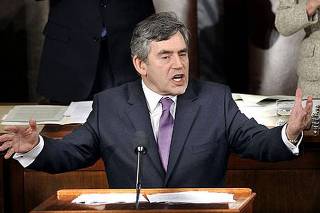British ex-PM backs calls for international funding for South Sudan education “crisis”
By Toby Collins
April 24, 2012 (LONDON) – The UK’s former prime minister, Gordon Brown, has launched a campaign calling on the World Bank, Global Partnership for Education (GPE) and other international organisations to tackle South Sudan’s “education crisis” after the release of a report ranking it as one of the world’s worst for education standards.

For children “trapped in conflict”, education can offer a “sense of normality and keep alive the hope of a better future”, according to Brown.
The aim of the campaign is to get 1 million children into school in South Sudan, which has a larger proportion of its children out of school than “almost any other country in the world, along with the deepest gender inequalities” according to Brown.
The report has revealed that of the countries for which data is available, South Sudan has the worst level of secondary education enrolment. Also, less than five percent of girls in South Sudan complete primary education; and in some parts of the country there are 200 students to every teacher.
After more than two decades of civil war, woeful under-investment under the former rule of Khartoum and statehood achieved only last year, much of South Sudan’s infrastructure is in urgent need of development.
Brown described an improved education system as also potentially have a positive impact in other fields such as nutrition, child survival and combating infectious diseases.
The report published by the office of Brown and his wife, Sarah Brown, described the education situation in South Sudan as an opportunity to show the attainability of international development goals, even within fragile states.
However, the report claims the GPE’s response to the education strategy produced by the Government of South Sudan was “a showcase for what is going wrong in an aid system that is too inflexible […] to the needs to conflict-affected countries”.
Brown is backing an online advocacy campaign calling for funding towards South Sudan’s education, before South is one year old, on 9 July 2012. It suggests US$180 million from the World Bank and GPE; US$30 million from the Organisation for Economic Co-operation and Development bilateral donors; and US$30 million from the Africa Development Bank/Africa Development Fund.
This is running concurrently with Brown’s attempts to engage the private sector in developing South Sudan’s education system as part of the “Education Without Borders” initiative and is part of a larger project to achieve the Millennium Development Goal of universal primary education by 2015.
Brown’s report suggests a plan which includes the construction of classrooms, teacher training and offering incentives to parents to get their children, and in particular girls, into school.
Co-convenor of the High Level Panel on Global Education, Graça Machel, said that basic education is the “birthright of every child”; even those in conflict-zones.
(ST)
